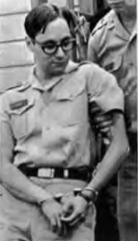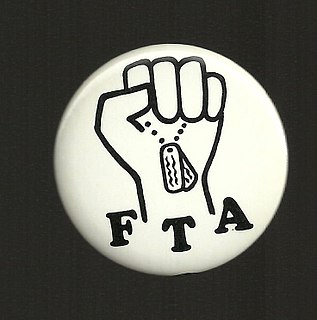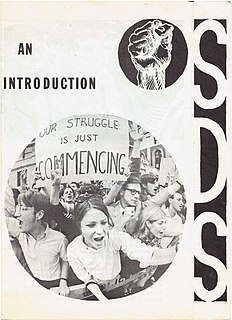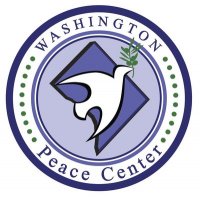 W
WAnother Mother for Peace (AMP) is a grass-roots anti-war advocacy group founded in 1967 in opposition to the U.S. war in Vietnam. The association is “dedicated to eliminating the use of war as a means of solving disputes among nations, people and ideologies. To accomplish this, they seek to educate citizens to take an active role in opposing war and building peace.”
 W
WThe Bread and Puppet Theater is a politically radical puppet theater, active since the 1960s, currently based in Glover, Vermont. Its founder and director is Peter Schumann.
 W
WThe Camden 28 were a group of Catholic left anti-Vietnam War activists who in 1971 planned and executed a raid on a Camden, New Jersey draft board. The raid resulted in a high-profile criminal trial of the activists that was seen by many as a referendum on the Vietnam War and as an example of jury nullification.
 W
WThe Concerned Officers Movement (COM) was an organization of mainly junior officers formed within the U.S. military in the early 1970s whose principal purpose was opposition to the U.S. involvement in the Vietnam War. Very quickly, however, it also found itself fighting for First Amendment rights within the military. It was initiated in the Washington, D.C. area by commissioned officers who were also Vietnam Veterans, but rapidly expanded throughout all branches and many bases of the U.S. military, ultimately playing an influential role in the opposition to the Vietnam War.
 W
WThe court-martial of Howard Levy occurred in 1967. Howard Levy was a United States Army doctor who became an early resister to the Vietnam War. In 1967, he was court-martialed at Fort Jackson, South Carolina, for refusing an order to train Green Beret medics on their way to Vietnam. He said it "became clear to me that the Army [was using medics] to 'win hearts and minds' in Vietnamese villages - while still burning them to the ground in search-and-destroy missions." He considered the Special Forces "killers of peasants and murderers of women and children".
 W
WThe court-martial of Lieutenant Susan Schnall, a U.S. Navy nurse stationed at the Oakland Naval Hospital in Oakland, California, took place in early 1969. Her political activities, which led to the military trial, may have garnered some of the most provocative news coverage during the early days of the U.S. antiwar movement against the Vietnam War. In October 1968, the San Francisco Chronicle called her the “Peace Leaflet Bomber” for raining tens of thousands of antiwar leaflets from a small airplane over several San Francisco Bay Area military installations and the deck of an aircraft carrier. The day after this “bombing” run, she marched in her officer’s uniform at the front of a large antiwar demonstration, knowing it was against military regulations. While the Navy was court-martialing her for “conduct unbecoming an officer” she was publicly telling the press “As far as I’m concerned, it’s conduct unbecoming to officers to send men to die in Vietnam.”
 W
WThe Fort Hood Three were three soldiers of the US Army – Private First Class James Johnson, Jr. Private David A. Samas, and Private Dennis Mora – who refused to be deployed to Vietnam in July 1966. This was the first public refusal of orders to Vietnam, and one of the earliest acts of resistance to the war from within the U.S. military. Their refusal was widely publicised and became a cause célèbre within the growing antiwar movement. They filed a federal suit against Secretary of Defense Robert S. McNamara and Secretary of the Army Stanley Resor to prevent their shipment to Southeast Asia and were court-martialed by the Army for insubordination.
 W
WGI Coffeehouses were a consequential part of the anti-war movement during the Vietnam War era, particularly the resistance to the war within the U.S. military. They were mainly organized by civilian anti-war activists as a method of supporting antiwar and anti-military sentiment among GIs, but many GIs participated as well. They were created in numerous cities and towns near U.S. military bases throughout the U.S as well as Germany and Japan. Due to the normal high turnover rate of GIs at military bases plus the military's response which often involved transfer, discharge and demotion, not to mention the hostility of the pro-military towns where many coffeehouses were located, most of them were short-lived, but a few survived for several years and "contributed to some of the GI movement's most significant actions". The first GI coffeehouse of the Vietnam era was set up in January 1968 and the last closed in 1974. There have been a few additional coffeehouses created during the U.S. led wars in Iraq and Afghanistan.
 W
WGI's Against Fascism was a small, short-lived organization formed within the U.S. Navy during the years of conscription and the Vietnam War. The group grew out of a small number of sailors requesting adequate quarters, but coalesced into a small formal organization with a wider agenda: a more generalized opposition to the war and to perceived institutionalized racism within the U.S. Navy. Although there had been earlier antiwar and GI resistance groups within the U.S. Army during the Vietnam era, 'GI's Against Fascism' appears to be the first such group in the U.S. Navy. The group published an underground newspaper as a means of spreading its views.
 W
WThe Movement for a Democratic Military (MDM) was an antiwar and GI rights organization during the Vietnam War. Initially formed in late 1969 as a merger of sailors from San Diego and marines from the Camp Pendleton Marine Base in Oceanside, CA, it rapidly spread to a number of other cities and bases in California and the mid-West, including San Francisco, Long Beach Naval Station, El Toro Marine Air Station, Fort Ord, Fort Carson and the Great Lakes Naval Training Center. Heavily influenced by the Black Panther Party and the Black militancy of the times., it became one of the more radical GI organizations during that era and was investigated in 1971 by the House Committee on Internal Security. As with much of the GI movement during this era, chapters had a high turnover as members were transferred, discharged and disciplined by the military. By late 1970 several chapters had splintered or disbanded, but the group's name and demands proved popular within the GI resistance movement overall. Some chapters continued through 1971 and 1972 and one until 1975.
 W
WThe Peace and Freedom Party (PFP) is a left-wing political party with affiliates and former members in more than a dozen American states, including California, Colorado, Florida, Hawaii, Indiana and Utah, but none now have ballot status besides California. Peace and Freedom's first candidates appeared on the ballot in 1966 in New York. The Peace and Freedom Party of California was organized in early 1967, gathering over 103,000 registrants which qualified its ballot status in January 1968 under the California Secretary of State Report of Registration.
 W
WThe Stop Our Ship (SOS) movement, a component of the overall civilian and GI movements against the Vietnam War, was directed towards and developed on board U.S. Navy ships, particularly aircraft carriers heading to Southeast Asia. It was concentrated on and around major U.S. Naval stations and ships on the West Coast from mid-1970 to the end of the Vietnam War in 1975, and at its height involved tens of thousands of antiwar civilians, military personnel and veterans. It was sparked by the tactical shift of U.S. combat operations in Southeast Asia from the ground to the air. As the ground war stalemated and Army grunts increasingly refused to fight or resisted the war in various other ways, the U.S. “turned increasingly to air bombardment”. By 1972 there were twice as many Seventh Fleet aircraft carriers in the Gulf of Tonkin as previously and the antiwar movement, which was at its height in the U.S. and worldwide, became a significant factor in the Navy. While no ships were actually prevented from returning to war, the campaigns, combined with the broad antiwar and rebellious sentiment of the times, stirred up substantial difficulties for the Navy, including active duty sailors refusing to sail with their ships, circulating petitions and antiwar propaganda on board, disobeying orders, and committing sabotage, as well as persistent civilian antiwar activity in support of dissident sailors. Several ship combat missions were postponed or altered and one ship was delayed by a combination of a civilian blockade and crewmen jumping overboard.
 W
WThe Student Nonviolent Coordinating Committee was the principal channel of student commitment in the United States to the Civil Rights Movement during the 1960s. Emerging in 1960 from the student-led sit-ins at segregated lunch counters in Greensboro, North Carolina and Nashville, Tennessee, the Committee sought to coordinate and assist direct-action challenges to the civic segregation and political exclusion of African Americans. From 1962, with the support of the Voter Education Project, SNCC committed to the registration and mobilization of black voters in the Deep South. Affiliates such as the Mississippi Freedom Democratic Party and the Lowndes County Freedom Organization in Alabama increased dramatically the pressure on federal and state government to enforce constitutional protections. But by the mid-1960s the measured nature of the gains made, and the violence with which they were resisted, were generating dissent from the group's principles of non-violence, of white participation in the movement, and of field-driven, as opposed to national-office, leadership and direction. At the same time organizers were being lost to a de-segregating Democratic Party and to federally-funded anti-poverty programs. Following an aborted merger with the Black Panther Party in 1968, SNCC effectively dissolved. SNCC is nonetheless credited in its brief existence with breaking down barriers, both institutional and psychological, to the empowerment of African-American communities.
 W
WStudents for a Democratic Society (SDS) was a national student activist organization in the United States during the 1960s, and was one of the principal representations of the New Left. Disdaining permanent leaders, hierarchical relationships and parliamentary procedure, the founders conceived of the organization as a broad exercise in "participatory democracy." From its launch in 1960 it grew rapidly in the course of the tumultuous decade with over 300 campus chapters and 30,000 supporters recorded nationwide by its last national convention in 1969. The organization splintered at that convention amidst rivalry between factions seeking to impose national leadership and direction, and disputing "revolutionary" positions on, among other issues, the Vietnam War and Black Power.
 W
WThe United NLF Groups was a Swedish popular movement that sought to mobilize support for the struggle of the Vietnamese National Liberation Front.
 W
WVietnam Veterans Against the War (VVAW) is an American tax-exempt non-profit organization and corporation founded in 1967 to oppose the United States policy and participation in the Vietnam War. VVAW says it is a national veterans' organization that campaigns for peace, justice, and the rights of all United States military veterans. It publishes a twice-yearly newsletter, The Veteran; this was earlier published more frequently as 1st Casualty (1971–1972) and then as Winter Soldier (1973–1975).
 W
WThe Washington Peace Center is a justice-oriented grassroots organization founded and currently located in Washington, D.C. The organization provides education, support, and resources to activist groups. The Peace Center aims to strategically link organizations to establish "structures and relationships that are nonviolent, non-hierarchical, humane and just."